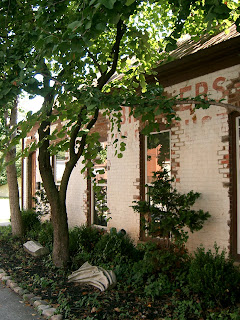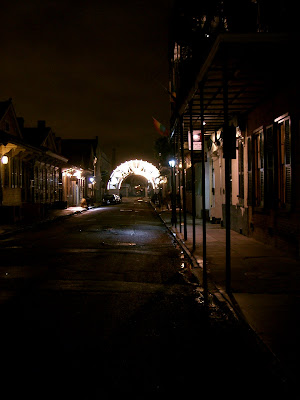 |
| I've been back by here in the years since I took this; the beads are still there |
New Orleans is my favorite place that isn't home. In fact, I hope that one day it will
be home, at least for a while. Over on
The Vegan Home Chef, I expressed some of that love in the form of
Ginger-Mint Juleps, inspired by an old advertisement mural on Decatur Street in the French Quarter. That got me thinking about all the years of photos I've taken in NOLA. Usually, I get too distracted by the city itself and forget to take pictures (something that is fairly representative of how absorbed I get when I'm traveling), but I've been so many times now that just sheer volume has produced some decent shots. I only had the chance to go once pre-Katrina, but I'm glad that I did, because some of those things aren't there anymore, like fish camps in the Honey Island Swamp, and parts of the New Orleans Botanical Garden. Eventually, I'll get to take a trip and really focus on photography (ha), and admittedly these are not really high quality, but I hope there's something here you might enjoy.
When I think about all of the pictures I've taken in the New Orleans, one shot jumps out to me. I was captivated by it my first time in the city, and was able to find it during in a post-Katrina visit, but there had been one important change:
 |
| Pre-Katrina |
 |
| And Post-Katrina |
|
|
|
|
Note the flag: it says, in English, "Louisiana Creole," then in in Creole, "Moun Kréyòl La Lwizyàn." Katrina may have threatened every element of life in South Louisiana and Mississippi, but for many people, it just made their dedication to their home, culture, and lifestyle that much deeper. I have so much respect for that.
On my first trip to the city, I was with my mother and her best friend, Virginia, who wanted to take a tour bus around the parts of the city outside the French Quarter to get a better idea of the city as a whole. There weren't very many people of the bus, so we sat up front and talked to the driver. Virginia asked him if locals worried about what would happen if they got hit by a serious storm. He said (and I paraphrase, this was almost 8 years ago), "Nah, we don't worry about it. But we all know the big one's coming." Then he switched into tour-guide mode and explained to us the whole concept of
laissez les bon temps rouler.
 |
| During Mardi Gras |
 |
| A slightly more subtle approach |
I suspect that the kind of happy fatalism embodied in that idea has helped the people of that area adapt to the storms, floods, yearly floods of tourists, and innumerable other pestilences. Expect it, but don't let it stop you from having a good time.
Maybe that's why the Saints have become nearly as revered as their namesakes post-Katrina: the Cinderella-story of it all. A season of wild hope, of Louisianans all over the country gathering to watch the games and making copious amounts of étouffée (I got to be a part of one of these groups via my own Cajun connections), all culminating in one bright, shining moment.

Louisiana has always loved its football, but it was LSU that was getting most of the attention; I can't tell you how many tiger tails I've seen hanging off the backs of pickup trucks. The Saints were pretty mediocre for a while and before that they were worse. The team was in bad shape when Katrina hit, and in the fall of 2005 paid about as much attention to playing football as you'd expect with their city reeling from one of the worst storms in its history. Then, in January of 2006, as the country was still struggling to grasp the full extent of the damage, the Saints hired Sean Payton as head coach. There were a couple of less-than-impressive seasons, but support at home was unparallelled. For the 2006 season, their first back in their home stadium, the Saints sold out the Superdome - with season tickets. Then they did it again the next year. All this with huge numbers of Louisianans in other parts of the country after losing their homes.
By 2009, Payton and Drew Brees, had built such a strong program that they were able to win the first 13 games of their season, beating the 1985 Chicago Bears out for the longest undefeated season opening. This, of course, took them to the playoffs, and the rest is much-celebrated history.
Drew Brees was the Grand Marshal of the Bacchus parade at my first Mardi Gras, just a week after the Superbowl, and there is no rock star in the world who could have elicited a more passionate response from a crowd. People
love the Saints.
Enough philosophizing for the moment; let's get back to the party.
 |
| This Guy. Just take the blur as a representation of the daiquiri-haze |
 |
| This is what you get for buying those giant-ass beads from the tourist stores |
This was taken on Bourbon during Mardi Gras 2011. It was more crowded than I've ever seen it, almost certainly because this year's festivities coincided with spring break for a number of colleges in the region. From dark until 3 or 4 in the morning, there was literally no physical space unoccupied for something like 5 blocks. Strings of people were holding hands and pulling each other through the crowd. It is fascinating to be completely pressed up against someone else, not greeting or even acknowledging each other, just acting like full-body contact is normal. It's interesting, but I've had so many more spontaneous conversations with strangers when there's a comfortable amount of space between us than when I wouldn't even have to move my head to lick them on the face.
 |
| My friend Kelly, in the most convincing of the dozens of pictures we took with a fake boob someone threw us from one of the balconies |
 |
| Jackson Square at night with a typical fog hanging over the city |
It has amazed me how quickly evidences of the damage caused by Katrina have just been absorbed into the city's patina. Some places would be desperately trying to get rid of all traces, but New Orleans just seems to accept that "what's past is prologue." That's one of my favorite quotes, from The Tempest (which is funny, because I thought of the phrase before I remembered what it was from... and now I'm a little embarrassed to quote The Tempest while talking about Katrina). I use it in a slightly broader way than originally intended, but in this case the original passage makes an interesting addition to this whole discussion, so I'll include it:
We all were sea-swallow'd, though some cast again,
And by that destiny to perform an act
Whereof what's past is prologue, what to come
In yours and my discharge.
(Act Two, Scene 1)
There are always storms, and not everyone makes it through; the survivors may be called upon to do extraordinary things, but it is their world to remake.
 |
| Another, slightly more commercial, example of NOLA pride - jewelry featuring these water meter covers is everywhere |
Now, some pictures of things as they were before, and some of things that are no longer there.
 |
| Holding cells for the remains of family members - a family crypt has to stay sealed for a year after the death of the last person (before the remains have been cremated naturally by the heat), so if more than one person dies in a year, they go in there... |
 |
| One day, I happened upon a wedding in Jackson Square |
 |
| A live oak at the New Orleans Botanical Gardens, which suffered a great deal of damage |
The swamps, however, evolved to absorb all that water, and while many of the "fish camps" (houses on or near the water built as fishing retreats) didn't survive, the swamps will.
There was such amazing, innovative diversity in the fish camps, so I'm including what is probably way to many pictures of them.
 |
| This one's my favorite |
 |
| Still, there are reasons that I wouldn't want my front porch in the water. |
I really wanted to go down there one more time before heading to Scotland, but that isn't going to happen, so I'll be good and ready by the time I get to go back. Here's one goofy parting shot:
I really like the look on his face.
See you next time!



































